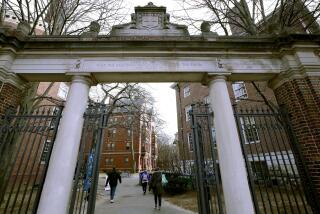Scholar With Revoked Visa Resigns
SOUTH BEND, Ind. — A Muslim scholar resigned his appointment to the University of Notre Dame on Tuesday, four months after the Bush administration revoked his work visa.
“I’m abandoning the idea of moving to the United States,” Tariq Ramadan told Associated Press from Geneva. “I want to maintain my dignity.”
Ramadan notified the university on Monday, citing the stress on him and his family from the uncertainty of their situation, said R. Scott Appleby, director of Notre Dame’s Kroc Institute for International Peace Studies.
Ramadan, a Swiss citizen, was barred from working in the United States in August just days before he was to begin teaching at Notre Dame. The Department of Homeland Security cited security concerns but released no specifics. Ramadan’s work visa was issued in May.
Ramadan said Tuesday there was nothing in his past to justify the ban and demanded that U.S. authorities give details of its investigation to clear him of claims that he was barred because of ties to terrorism.
He took a year’s unpaid leave from his posts in Switzerland to work at Notre Dame and is now out of a job.
He had been paid by Notre Dame until he resigned, said Matt Storin, a university spokesman.
The revocation of his visa sparked protests from at least four U.S. scholars groups, led a United Nations-sponsored institution to issue an academic freedom alert and inspired appeals on Ramadan’s behalf from some Jewish groups.
Many who have rallied in support of Ramadan believe the scholar’s sharp criticism of Israel, the war in Iraq and U.S. policy in the Mideast were the reasons for the revocation.
At the time, the Department of Homeland Security said the decision was based on “public safety or national security interests” and pointed to federal law applying to aliens who have used a “position of prominence ... to endorse or espouse terrorist activity.”
More to Read
Sign up for Essential California
The most important California stories and recommendations in your inbox every morning.
You may occasionally receive promotional content from the Los Angeles Times.










